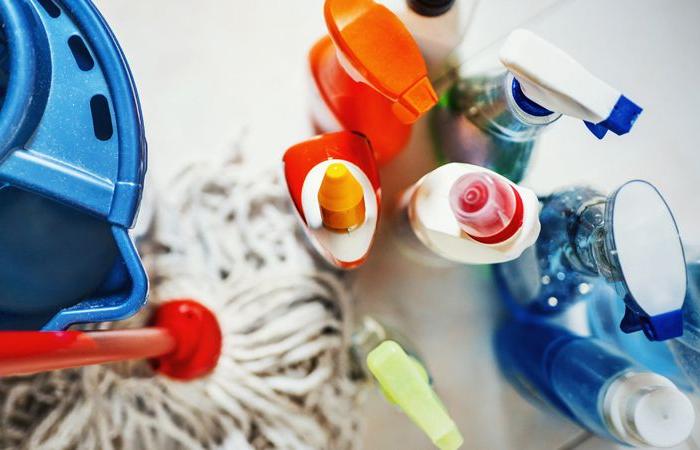A good bathroom detergent must meet two requirements: remove dirt and be effective against limescale. These two functions are possible thanks to the presence of surfactants, which act on dirt, and acidic ingredients, which remove limescale.
You surfactants are, in general, synthetic substances: they have names that end in “eth”, such as deceth, laureth or pareth. However, there are more and more products that use surfactants of natural origin (for example, coconut).
Now for the action against limestone, acidic substances are required, that is, with a low pH. Phosphoric acid, one of the strongest and widely used in the past, has been replaced: although effective, it is quite aggressive for surfaces and dangerous for the user. Alternatively, acetic, formic, citric or lactic acids are used, which are a good compromise between efficacy and safety.
Some products also advertise the ability to prevent limescale build-up. To this end, they use substances that form a protective film: covering the surface with a patina, they improve water drainage and make the deposition of limestone more difficult. Still, the best prevention is not so much creating this protective layer, but rather removing dirt well.
Spray detergent is more practical
Bathroom detergents are usually liquidssold in spray packaging, or in gel, packaged in bottles. Application to vertical surfaces, such as walls or shower glass, is much more practical with the spray.
There are also products in the form of cream abrasive. They remove dirt through abrasion, due to their granular formulation. In general, they contain alkaline (non-acidic) ingredients, which do not act as descaling agents.
The most liquid products slide very quickly on vertical surfaces, without having time to act. Therefore, its effectiveness will be lower.
Not all detergents are really ecological
There are detergents that claim ecological and environmentally friendly. But some use preservatives with a high environmental impact, such as methylisothiazolinone and benzisothiazolinone, unnecessary substances in products with such a low pH, which, in itself, prevents the proliferation of bacteria.
There are also products that claim to contain biodegradable surfactants or of natural origin. These are good choices to reduce environmental impact, but the entire formula needs to be considered. Also in these cases, the use of the aforementioned preservatives is unjustified, given that they are toxic to aquatic organisms, are not easily biodegradable and have moderate bioaccumulation.
Perfumes, widely used to guarantee the “smell of cleanliness”, are poorly biodegradable and often allergenic.
In practice, the only mention that can provide security is the European Ecolabela certification that guarantees low environmental impact.
Disinfecting your home 100% is an illusion
As a rule, in our homes, normal cleaning is sufficient, and there is no need to disinfect everything. Kill 99.9% of bacteriaas some products promise, it is not necessary and it lasts very little, because the environment we live in is not aseptic. Biocidal ingredients, which kill living beings, have a terrible impact on the environment, because they attack all bacteria they encounter, even those that are not harmful.
Of course, everything can change under exceptional conditions, such as a health emergency: the instructions for cleaning the house, in this scenario, must be reinforced, especially in places where people pass by.
How to use bathroom detergents safely?
Using this type of detergent requires some precautions.
- When applying these products, do not forget to lgrape.
- Do not mix detergents with other substances, especially bleach. Because it is acidic, it can trigger a chemical reaction that releases toxic gases.
- Before starting cleaning, remove all objects from surfacessuch as cups, baskets and soap dishes.
- Protect outlets or turn off the mirror’s electrical circuit to avoid the risk of electrocution.
- These products can be aggressive for metals, plastics and chrome, if they are in contact with the materials for too long. Respect the operating time indicated on the label and eliminate traces of detergent.
- Pass one dry cloth or a sponge after rinsing, to keep surfaces shiny.
- Store detergents with the tight lid and, if they have a sprayer, keep it locked.
- Keep products in their original packaging, away from the reach of childrento avoid accidents.
- If you cannot prevent them, call 911 or the Poison Information Center (800 250 250). By keeping the product in its original packaging, you can inform healthcare professionals of its composition.
Is it possible to clean without detergent?
Prevention is the best medicine for prevent mold or difficult stains. As soon as you finish your shower, squeegee the tiles and glass of the shower or bathtub, from top to bottom. Alternatively, use a microfiber cloth, which absorbs grease and water. Do this, preferably, while the surface is still hot, to better remove the dirt left behind by the bath.
To eliminate limescale stains, you can use homemade solutions, environmentally friendly, but don’t expect more than modest performance. They do not have firepower against all types of dirt, especially the most installed type.
Citric acid
Use pure, on limescale deposits, and diluted, at the rate of a cup of coffee in a liter of water, to attack dirt. As it is a very strong acid, it has a high anti-scale power. However, it is not effective in removing soap residues, nor does it prevent the formation of limescale.
Vinegar
It can be used pure, to eliminate limescale, and diluted, also in the proportion of one cup of coffee to one liter of water, if the objective is to clean the dirt. By acting for at least five minutes, it eliminates some limescale on horizontal surfaces. Not aggressive to materials, nor for the user. The main drawback is the smell.
Sodium bicarbonate
It should be used diluted: two tablespoons for a liter of water is the right proportion. Not very effective at removing limescale, it removes dirt due to the slight abrasive effect of the dust grains. Despite being safe and odorless, it has the disadvantage of leaving traces on surfaces. So, after applying the mixture, rinse it off.






